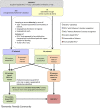Dementia Friendly Communities in England: A scoping study
- PMID: 30993756
- PMCID: PMC6766876
- DOI: 10.1002/gps.5123
Dementia Friendly Communities in England: A scoping study
Abstract
Objectives: To describe the characteristics of Dementia Friendly Communities (DFCs) across England in order to inform a national evaluation of their impact on the lives of those affected by dementia.
Methods: DFCs in England were identified through online searches and Alzheimer's Society records. A subsample (n = 100) were purposively selected for in-depth study based on online searches and, where necessary, follow-up telephone calls. Data collection and analysis were guided by a pilot evaluation tool for DFCs that addressed how DFCs are organised and resourced and how their impact is assessed. The evidence was predominantly qualitative, in addition to some descriptive quantitative information.
Results: Of 284 DFCs identified, 251 were defined by geographical location, while 33 were communities of interest. Among 100 sampled DFCs, 89 had been set up or started activities following policy endorsement of DFCs in 2012. In the resourcing of DFCs, statutory agencies and charities played an important role. Among DFC activities, awareness raising was cited most commonly. There was some evidence of involvement of people living with dementia in organisational and operational aspects of DFCs. Approaches to evaluation varied, with little evidence of findings having effected change.
Conclusions: DFCs are characterised by variation in type, resourcing, and activities. England has policy endorsement and a recognition system for DFCs. These can be important catalysts for initiation and growth. A systematic approach to evaluation is lacking. This would enable DFCs to be consistent in how they demonstrate progress and how they enable people living with dementia to live well.
Keywords: Dementia Friendly Communities; England; awareness raising; dementia; evaluation tool; inclusion; older adults; online data.
© 2019 The Authors. International Journal of Geriatric Psychiatry Published by John Wiley & Sons Ltd.
Conflict of interest statement
None declared.
Figures
References
-
- Prince M, Wimo A, Guerchet M, Ali G‐C, Wu Y‐T, Prina M. World Alzheimer Report 2015: the global impact of dementia. London: Alzheimer's Disease International; 2015.
-
- Hebert CA, Scales K. Dementia friendly initiatives: a state of the science review. Dementia. 2017;1‐38. 147130121773143. - PubMed
-
- Organisation for Economic Co‐operation and Development. Care needed: improving the lives of people with dementia. Paris: OECD Publishing; 2018.
-
- Alzheimer's Disease International. Dementia Friendly Communities: global developments. London: Alzheimer's Disease International; 2016.
-
- Department of Health . Prime Minister's Challenge on Dementia: delivering major improvements in dementia care and research by 2015. London: Department of Health; 2012.
Publication types
MeSH terms
Grants and funding
LinkOut - more resources
Full Text Sources
Medical



